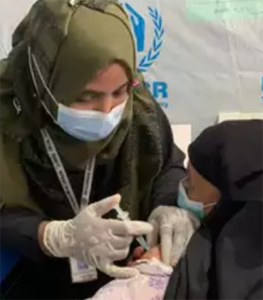Refugee vaccine programs hit turbulence
Refugees are slipping down the queues to get COVID-19 vaccines in many countries, according to new data from the UN refugee agency UNHCR.
For months the World Health Organization (WHO) has been urging countries to vaccinate refugees and have identified them in the second most at-risk group, along with people with serious health conditions.
 The UNHCR says many refugees live in crowded conditions where the virus could spread more easily; and they also often have limited access to healthcare and clean water.
The UNHCR says many refugees live in crowded conditions where the virus could spread more easily; and they also often have limited access to healthcare and clean water.
More than 160 countries initially included refugees in their vaccination plans. But some of those plans have changed with shortages in the supply of vaccines.
The WHO says that globally about 85 per cent of vaccines have so far been given out by rich nations. But at the same time, it estimates that 85 per cent of the world’s 26 million refugees live in developing countries which are struggling to vaccinate the most vulnerable
Some countries, like Bangladesh, had high hopes for COVAX, an international program that aims to provide vaccines to poorer nations.
Bangladesh had planned to vaccinate almost 1 million Rohingya refugees living in crowded camps on the border with Myanmar in February.
But with limited doses of vaccine received through COVAX, that program has only just started.
Recently, the government of Bangladesh and aid agencies started vaccinating Rohingya refugees against a COVID-19 surge in cases.
The highly transmissible Delta variant is driving an infection surge across Bangladesh, with about 20,000 infections and 200 deaths recorded so far in Cox’s Bazar district, the southern region bordering Myanmar where the 34 refugee camps are located.
Worldwide, the COVAX program has provided less than eight per cent of the two billion vaccine doses it had promised by the end of this year.
Even in countries where refugee vaccinations have started, supplies remain low.
In Uganda’s Bidi Bidi camp, less than two percent of 200,000 refugees have received a single shot of the AstraZeneca vaccine. Second doses are also in short supply after India stopped donating them when its own virus cases surged.
In some countries, such as India, there is a requirement for documents like passports or other government identification before people are eligible for vaccines.
UNHCR points out that many refugees do not have that identification.
India has eased the requirements, but language barriers and misinformation about vaccines continue to cause problems.
The Red Cross has reported that while refugees are getting jabs in European Union countries, the situation is worse in other areas of Europe.
For example, only 1.5 percent of people in Armenia and 4.2 percent in Ukraine are fully vaccinated.
In some countries, like Montenegro, the fear of arrest or deportation remains a barrier, the Red Cross said in a recent statement.
Even when supply increases, aid agencies say there is still a liability issue around vaccines.
Some humanitarian organisations can seek to give vaccines but in doing so they usually must accept liability for any serious side effects the vaccines may cause.
The NGO Doctors Without Borders has said it wants to access vaccines from manufacturers but does not want to accept liability for side effects.
Many vaccine makers have refused to enter deals for vaccines without that requirement. And some, but not all, governments are prepared offer indemnity over side effects
UNHCR says that as COVID-19 continues to spread, some countries could face great difficulties if they cannot find ways to effectively vaccinate their refugee populations.
“The virus doesn’t distinguish between a national and a refugee. So, if you don’t protect and save your refugee population, it becomes a public health issue,” the agency said in a recent statement.












